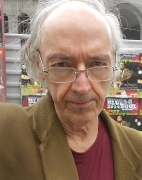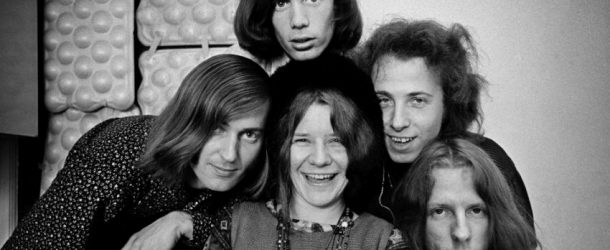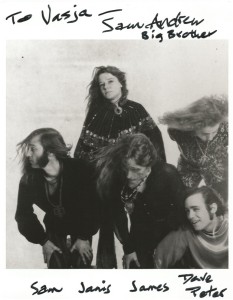SAM ANDREW – Interview (by Vasja Ivanovski)
VI: Tell me more about your musical beginnings.
SA: I began playing the guitar, because that is the instrument my father played. He was a music reader and my mother’s family were intuitive musicians who played by the ear. I think I inherited both qualities. I listened to T-Bone Walker, Little Richard, Hank Williams, Chuck Berry, Ivory Joe Hunter, Charlie Parker, Fats Domino, Chet Atkins, Paul Desmond, The Moonglows… and on and on, such great musicians. I always loved all music.
VI: San Francisco became musical center of USA in Mid 60’s and you were part of that scene. Prior to forming Big Brother and The Holding Company, did you play in some other bands in the area?
SA: I played saxophone in a small band in Marin County which is just over the Golden Gate Bridge from San Francisco. In this band I played with John Cipollina, who later helped form The Quicksilver Messenger Service. We did some silly songs and had a lot of fun. I also played jazz on the guitar and joined up with the people to play in clubs, but this was sporadic and unorganized.
VA: In Irwin Stambler’s “Encyclopaedia of Pop, Rock and Soul”, it is stated that you met with future Big Brother members Peter Albin and James Gurley at a Victorian house in San Francisco where Chet Helms also was. How did you get together, did you share the same ideas about music and who gave you the name Big Brother and The Holding Company?
SA: I heard Peter Albin playing one day in a beautiful Victorian house in San Francisco. I climbed the stairs to his room, introduced myself, and said: ”Let’s form a band”. This was before Chet Helms or James Gurley were there. When Chet came to hear us play in the basement, he brought James Gurley to be in our band, and he brought a list of names. One of them was Big Brother and the other The Holding Company. We just put them together!
VI: Did you play any of your songs then or you were just jamming or something?
SA: I always wrote songs, even when I was a small child. So, when Big Brother started, I had a lot of songs for the band. We also played covers, songs done by other bands.
VI: I understand that at the time San Francisco had hundreds of great bands, tough competition indeed. How did you manage to get to the top with the names like Grateful Dead, Jefferson Airplane, Country Joe and The Fish? Was that quality of the band, good material, manager, circumstances or combination of all these elements te reason for your success?
SA: There weren’t many bands at first. Not many at all. We thought there were maybe for of five bands when we started: The Charlatans, Jefferson Airplane, Great Society, Quicksilver Messenger Service, Country Joe. That was about it. We were one of these bands before we had Janis Joplin. We played without her for about a year, we were known in San Francisco… as known as these other bands. I think “circumstances” would be the right answer to the question you’re asking. “Circumstances” and “manager”. For success you need talent, timing, hard work and good people to help you.
Many people had a lot of talent, but not many have all four of these things. Hard work and timing (circumstances) may be the most important things.
VI: When did you meet Janis Joplin, how did she become a member of the bad, who “discovered” her, some of you or somebody suggested to check her out? Was she also in San Francisco at the time or she came from somewhere?
SA: Chet was “the big brother” in Big Brother. He was probably the main reason for our early success. He named the band (I was there and helped with that). He brought James Gurley to the band. He brought Janis to the band. He had known Janis at The University of Texas where they both went to school. He knew we needed a singer, so he sent a friend and bring her to San Francisco.
VI: With Janis in the band, was there any change in musical policy of Big Brother? Who was in charge of material for playing?
SA: When Janis came to the band, our music became more “normal”, conventional and regular. We did not have a band leader. I was the one who knew most about the music and I did the arranging of the songs. When it came down to business, Peter Albin, the bass player made most of decisions.
VI: Which time period do you personally consider as most satisfying for you as a musician?
SA: I like them all. I liked the energy of the 60’s. I enjoyed going back to school in the 70’s and learning harmony and counterpoint and writing classical music pieces, especially string quartets. I played jazz in the 80’s on saxophone, and I really liked that. Then in the 90’s I wrote a lot of songs and played as The Sam Andrew Band with a lot of talented people. I have enjoyed all my time as a musician.
VI: You’ve played numerous concerts, big festivals, do you have some special recollections, fond memories?
SA: I was fun playing in Albert Hall in London. One night I got drunk in Stockholm with Mayor. That was good. Janis gave me her Gibson Hummingbird guitar and I think of her when I play it which is all the time.
VI: You’ve also played and shared the stage with many rock and blues legends, could you name some special names for you? Any musicians that you wanted to play with, but for some reasons you did not?
SA: I was good to be close to Jimi Hendrix and watch him play. He was very quiet man and he gave a lot of thought to his music. B.B. King was very special to me, he was always our guitar hero, so it was privilege to play on the same stage with him. I wish I would have met John Coltrane and Cannonball Adderley. They had such an influence on me.
VI: What are your memories of Janis? Were you close friends, what was she like as a person?
SA: Janis was very intelligent and funny person. We wrote a lot of songs together and we had a lot of jokes and laughs. She was quick-witted and you could count on her to say something very striking, funny and true almost all the time. She enjoyed life, but she has a certain cynical view of it too.
VI: Do You have and regrets about those days, something that you wanted to do, but didn’t?
SA: My main regret is that I left Big Brother to join The Kozmic Blues Band. I don’t think Janis and I should have left the band when we did it. It was a big mistake. She could have left later, if she wanted, and I think she would have been happier. Also, I wish I would have written more songs, and maybe more in different styles. Music is always exciting and I find something new in what I am playing. I am not in the race to be the faster guitar player in the world. I want to find something really new in the melodies and bring that out for people while playing something they want to hear. Since I will never accomplish this completely, I can never be bored with the music. It’s always a challenge.
VI: What could you say about the current music scene around you, is it comparable to the sounds of those days? I think you’re the one who could tell it best?
SA: Musicians are better now. They have better technique and they have better education. They are probably more disciplined too, than we were. But I don’t think they have the same inspiration that we had. There is not that wild sense of promise in music now that there was in the 60’s. And having that feeling is very important for an artist It gives a focus and direction to the music. But I think this feeling can come back to music any time.
VI: Were you / band in control of Big Brother releases through the years, numerous compilations, unreleased concerts, live tapes, etc?
SA: We are in partnership with Janis’ brother and sister who inherited her share of what we did in Big Brother. Sony Music has most of the recorded material that we did (aside from bootlegs) and they will release it all the time. Usually they talk to the brother and sister first. This is strange for us and the brother and sister didn’t really have anything to do with the making of the music in the first place. They were just children when we played with Janis. But they are good people and we try to get along, love each other and work for the same goal.
VI: I wanted to ask you about the record covers of your releases, especially the one made by Robert Crumb. Also about other covers, who had the last say?
 SA: When it came to decide on a cover for “Cheap Thrills” album, we were all reading those great underground comics, but especially Zap Comics. We knew all the artists – Victor Moscoso, Wes Wilson, S. Clay Wilson, Gilbert Shelton, Mouse and Kelly, but the eminence grise was, of course, Robert Crumb. I think we decided on having him do the cover because we wanted to get to know him better. Janis was the one who made this decision, although she was really enthusiastic about it, we all agreed. Crumb came to where we were playing… The Fillmore, I think… and he watched us for three hours or so. The idea was that he was going to make our album cover like a school yearbook and it would show our photograph and then have a little biographical blurb about us. For the original front of the album he drew a yearbook cover. We really didn’t care about that front (although, don’t I wish I had that drawing today!) and we put the back cover on the front. That “back cover” really looks like a back cover if you know it was supposed a back. It’s basically a series of credits for who did what on the album. The amazing thing about Crumb is that he could come and look at us. For such a short time, and in his drawing of us he revealed who we were, or who we were trying to be. The image of James Gurley shows him to be spaced out holy man, The Saint James, Archfiend of the Universe, that he is today. The drawing of Dave doesn’t show him at all, and that too is a revealing portrait. I have often thought that the other name for Big brother and The Holding Company should be “Where’s Dave?” because he constantly wanders off and is nowhere to be found. He is really lost. Janis looks, in Crumb’s drawing, exactly as she wanted to present herself and anyone who knows Peter Albin knows that he is the person in Crumb’s drawing. I was at that concert where Crumb came to look at us with a couple of good friends of mine who are still good friends of mine. They were blond and they were having a really good time. We all enjoyed being with each other and they were intelligent, articulate fine women. Crumb drew me surrounded by blondes and he captured a certain smirk (better that George Jr. Bush’s) of self satisfaction on my face. It’s just a portrait of who I was at the time, but the blond women were friends and not fans.
SA: When it came to decide on a cover for “Cheap Thrills” album, we were all reading those great underground comics, but especially Zap Comics. We knew all the artists – Victor Moscoso, Wes Wilson, S. Clay Wilson, Gilbert Shelton, Mouse and Kelly, but the eminence grise was, of course, Robert Crumb. I think we decided on having him do the cover because we wanted to get to know him better. Janis was the one who made this decision, although she was really enthusiastic about it, we all agreed. Crumb came to where we were playing… The Fillmore, I think… and he watched us for three hours or so. The idea was that he was going to make our album cover like a school yearbook and it would show our photograph and then have a little biographical blurb about us. For the original front of the album he drew a yearbook cover. We really didn’t care about that front (although, don’t I wish I had that drawing today!) and we put the back cover on the front. That “back cover” really looks like a back cover if you know it was supposed a back. It’s basically a series of credits for who did what on the album. The amazing thing about Crumb is that he could come and look at us. For such a short time, and in his drawing of us he revealed who we were, or who we were trying to be. The image of James Gurley shows him to be spaced out holy man, The Saint James, Archfiend of the Universe, that he is today. The drawing of Dave doesn’t show him at all, and that too is a revealing portrait. I have often thought that the other name for Big brother and The Holding Company should be “Where’s Dave?” because he constantly wanders off and is nowhere to be found. He is really lost. Janis looks, in Crumb’s drawing, exactly as she wanted to present herself and anyone who knows Peter Albin knows that he is the person in Crumb’s drawing. I was at that concert where Crumb came to look at us with a couple of good friends of mine who are still good friends of mine. They were blond and they were having a really good time. We all enjoyed being with each other and they were intelligent, articulate fine women. Crumb drew me surrounded by blondes and he captured a certain smirk (better that George Jr. Bush’s) of self satisfaction on my face. It’s just a portrait of who I was at the time, but the blond women were friends and not fans.
The Kozmic Blues Band was almost corporate band and it’s covers reflect that. That cover was done by the art department at Columbia Records. They copied the Crumb Lettering. All that cover was their idea. Janis had very little to say about the cover. We did two albums after Janis died. One of these covers is anti art and it is by Bob Seidermann (he did the famous Blind Faith album cover). The other album cover is done by Dennis Nolan whom is an excellent artist. He did a silhouette of us, but it shows who we were at the time, silhouettes of musicians trying to make it into early 70’s.
I am satisfied with how my career turned out to be. I was very lucky to be surrounded by great people and we all together made some cool music which is our legacy that I am very proud of…

Interviewer:
Vasja Ivanovski
Skopje, Makedonija

























